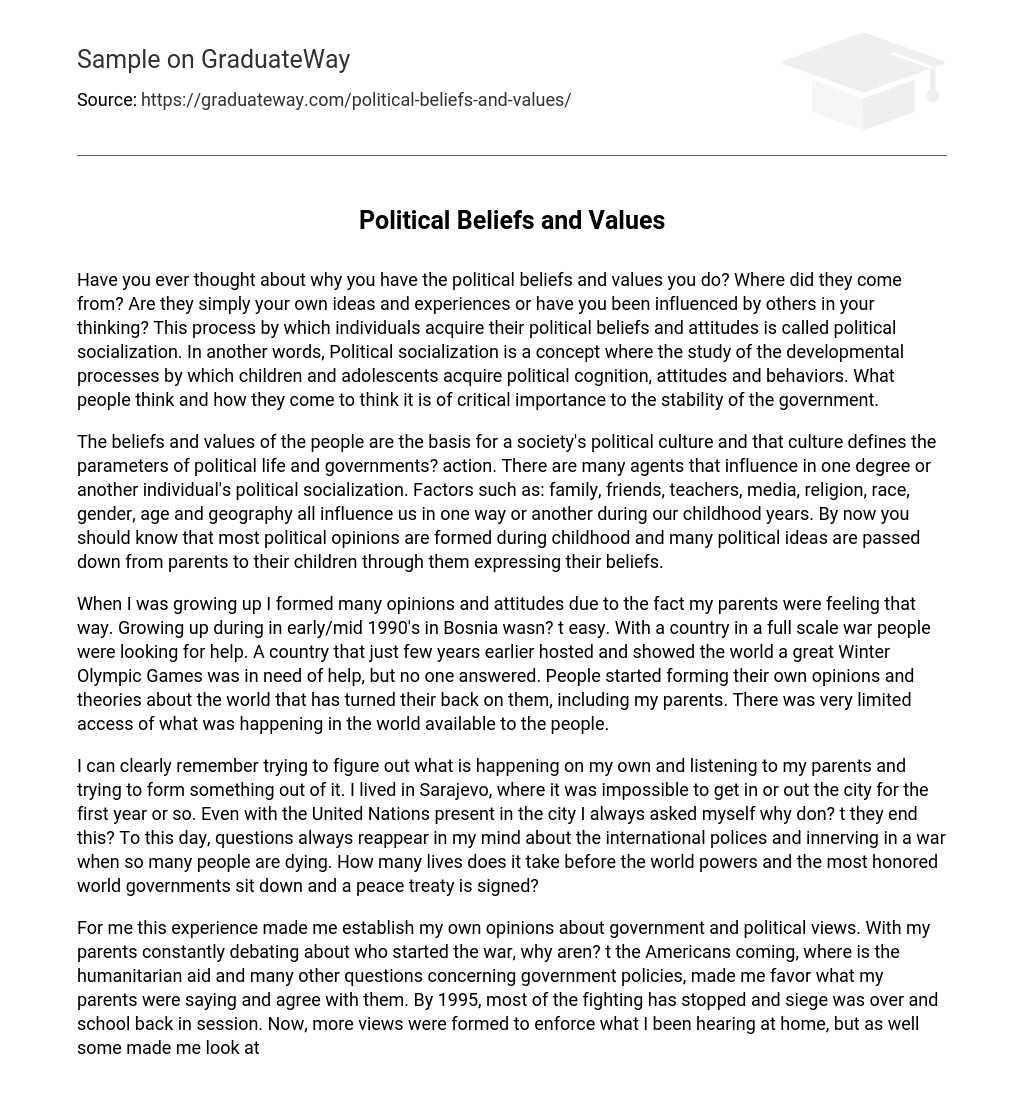Political socialization is the investigation of how people obtain their political beliefs and values. It explores whether these beliefs are solely influenced by personal experiences or if they have been molded by others. This procedure is significant for comprehending government stability as it involves scrutinizing how children and adolescents develop their political cognition, attitudes, and behaviors.
The political culture of a society is molded by the beliefs and values upheld by its citizens, which in turn dictate the limits of political life and government actions. An individual’s political socialization process during childhood is impacted by numerous factors such as family, friends, teachers, media, religion, race, gender, age, and geography. It is crucial to recognize that political perspectives are primarily shaped in childhood and frequently passed down from parents to their children through the expression of their own convictions.
During my childhood in Bosnia in the early/mid 1990s, I was deeply affected by my parents’ viewpoints and beliefs. Our nation had just hosted the Winter Olympic Games but soon after plunged into a devastating war. We desperately sought support, yet we were left alone as no one stepped forward to aid us. This situation prompted the formation of theories and perspectives on a world that appeared to have abandoned us. The scarcity of information about international events further exacerbated our circumstances.
While in Sarajevo, I have distinct recollections of the challenging endeavor to comprehend the situation independently while also grappling with my parents’ explanations. At first, access to and from the city was unattainable. Despite the presence of the United Nations in the area, I frequently pondered why they refrained from intervening and halting the conflict. Even now, I contemplate global policies and the involvement of influential nations in an ongoing war that claims numerous lives. How many more casualties must there be before esteemed world powers and governments can come together for negotiations and sign a peace treaty?
Having grown up in a household where my parents frequently debated government policies, I developed my own perspectives on politics. These discussions covered various topics such as the origins of wars, non-intervention by Americans, lack of humanitarian aid, and more. As a result of these debates, I found myself aligning with my parents’ viewpoints and agreeing with them.
By 1995, the fighting had mostly ceased and the siege was finally over. This created an opportunity for schools to reopen. The reopening of schools not only allowed me to solidify the beliefs I had absorbed at home but also gave me room to explore alternative perspectives on these issues.
Due to the hatred I faced in my childhood, I formed my own perspectives which were heavily influenced by this experience. Schools and family played important roles in introducing me to different political beliefs and shaping how I perceive the world. My friends and teachers, who I considered reliable sources of information, also contributed to molding my opinions. Even now, I continue to question the same issues that were talked about by my parents; they are not something I can easily let go of. It perplexes me why numerous individuals in Srebrenica had to endure shootings, murders, rapes, and killings despite being within a U.N safe zone.
School taught us the significance of history and remembering it, but as we returned to school, television, newspapers, and other mass media also made a comeback. The media gained control and attempted to manipulate how we perceived the events we had all lived through in the previous five years for their own financial benefit. Foreign investors took advantage of this opportunity to exploit others at a low cost. I vividly recall seeing the first commercial on national television promoting the new mall that replaced the demolished Olympic village, with the upcoming presence of the new president at its opening ceremony. Additionally, there was extensive advertising for a new lottery game featuring images of political party members.
Despite feeling like the previous year has been wiped away, new factors have started to emerge within me. I questioned if a religion is accountable for this dreadful war. The teachings of religion were prevalent in school amidst discussions on genocide and ethnic cleansing. It was challenging to form independent opinions during that time due to the overwhelming information from mass media and government policies. Now, as I reflect on everything that has happened, I contemplate how my thoughts and views on politics have evolved. My family, particularly the constant relationship between my parents and myself, greatly influenced my political orientation.
Schools reinforce the beliefs I hear at home, while Mass Media presents itself as a political educator to young people. By incorporating political figures into everyday life and aligning them with specific parties, one can only speculate on their intentions. The earliest form of socialization has the greatest impact as it aligns with my parents’ beliefs. Although my political preferences used to mirror theirs, now that I am older and influenced by a different culture, I am starting to reconsider many of my views on the world today.





